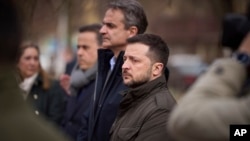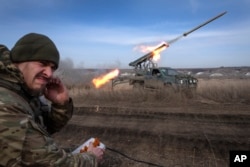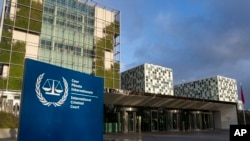The sound of a large explosion reverberated through Odesa on Wednesday, just as Ukrainian President Volodymyr Zelenskyy and Greek Prime Minister Kyriakos Mitsotakis were ending a tour of the war-ravaged southern city.
The Greek leader said officials were getting into their vehicles when they heard the blast, which he said was a "vivid reminder" that Odesa is gripped by the war with Russia.
Mitsotakis said it was one thing to hear about the war and "quite another to experience war firsthand."
Zelenskyy said the explosion killed an unknown number of people and wounded more. "You see who we're dealing with. They don't care where to hit," he told reporters.
Russian officials made no immediate comment.
Zelenskyy has regularly visited cities and military units on the front line during the war, always in secrecy until after he has left. Foreign leaders have made numerous trips to Ukraine, often to the capital of Kyiv, and they occasionally have had to take refuge in shelters when air raid sirens have sounded.
European Commission President Ursula von der Leyen, on the X social media platform, condemned what she called the "vile attack" during the Greek leader‘s visit. She called it a "new attempt at terror" by Russia.
Russian drone attacks
Zelenskyy showed Mitsotakis the destruction in Odesa, where the most recent major Russian attack killed 12 people — including five children — when debris from a Russian drone hit an apartment block on March 2.
Ukraine said Wednesday that it shot down 38 of the 42 drones that targeted eight Ukrainian regions, as well as destroying five Russian missiles.
Ukraine’s prosecutor general said seven people in Sumy were injured in one of the drone attacks. The intercepts took place over the Dnipropetrovsk, Odesa, Kherson, Khmelnytskyi, Cherkasy, Kharkiv, Vinnytsia and Sumy regions, the air force said.
Serhiy Lysak, the regional governor in Dnipropetrovsk, reported damage to a power line but said no one was hurt.
Ukrainian drone attacks
Russian officials said two Ukrainian drones attacked fuel facilities at one of Russia’s largest iron ore plants Wednesday.
Roman Staravoit, governor of the Kursk region, said the attack happened at the Mikhailovsky GOK iron ore plant, causing a fire but no injuries.
Russia’s defense ministry said Wednesday it thwarted two Ukrainian drone attacks over the Voronezh region, and another over the Belgorod region in western Russia.
The Kremlin on Wednesday rejected the International Criminal Court’s announcement of arrest warrants issued for two high-ranking Russian commanders wanted for suspected war crimes including directing attacks against civilian infrastructure in Ukraine.
“We don't recognize this," Kremlin spokesman Dmitry Peskov told reporters.
The warrants were issued for Lt. Gen. Sergei Ivanovich Kobylash, who commanded Russia’s Long-Range Aviation of the Aerospace Force, and Navy Adm. Viktor Kinolayevich Sokolov, who commanded Russia’s Black Sea Fleet.
“I have repeatedly emphasized that those responsible for actions that impact innocent civilians or protected objects must know that this conduct is bound by a set of rules reflected in international humanitarian law,” ICC Prosecutor Karim Khan said in a statement. “All wars have rules. Those rules bind all without exception.”
Ukrainian President Volodymyr Zelenskyy welcomed the development and expressed his thanks in his nightly address to “all the officials who are investigating Russian war crimes.”
"Every Russian commander who orders strikes against Ukrainian civilians and critical infrastructure must know that justice will be served. Every perpetrator of such crimes must know that they will be held accountable,” Zelenskyy wrote on X.
Some information for this report came from The Associated Press and Reuters







